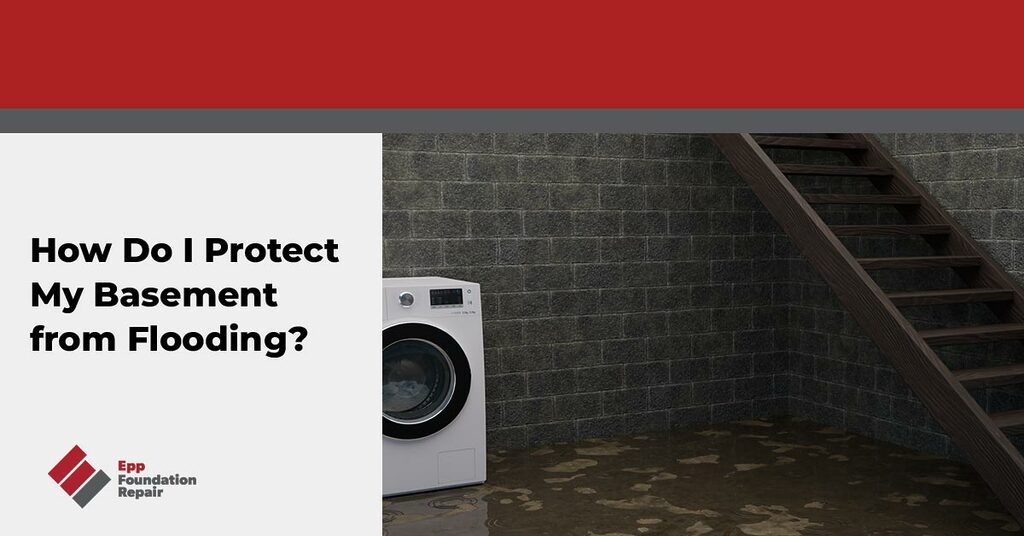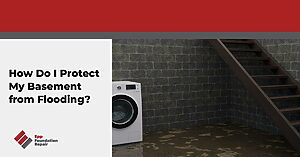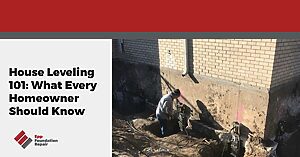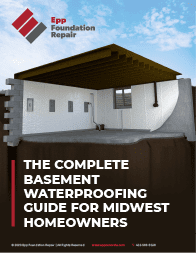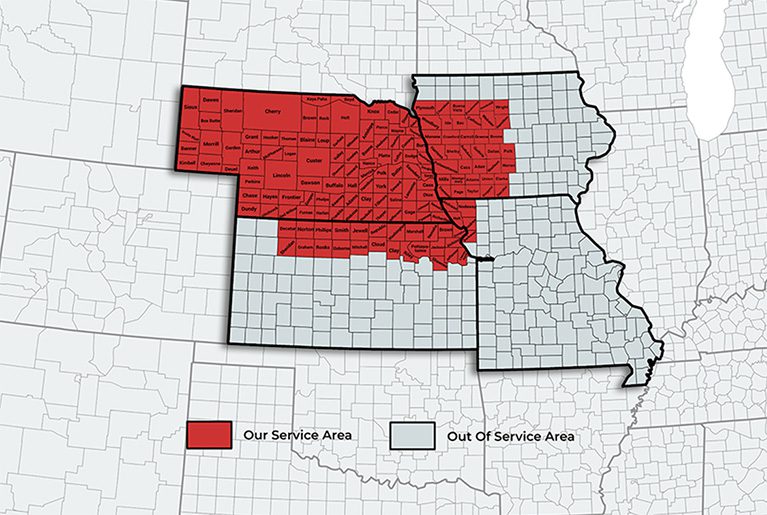Basement flooding is a common but an avoidable problem here in the Midwest. Protect your basement from flooding by following our four-step process: 1) Minimizing water in the soil around your basement, 2) Diverting water, 3) Waterproofing your basement, and 4) Maintaining your plumbing, appliances, and drainage systems.
Keep reading to learn why your basement may be flooding in the first place, the importance of a dry basement, how to implement our four-step flood protection process, and what to do if your basement is currently flooded.
Why Is My Basement Flooding?
A number of reasons can cause basement flooding. Still, they usually can be summed up into four categories:
1. Natural Causes
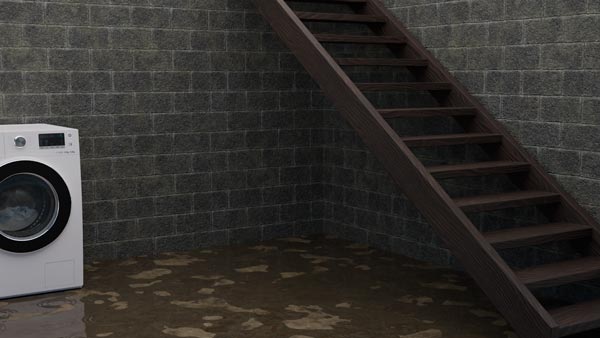
Heavy rain and snowfall are the most common reasons for basement flooding. With all the excess water in the ground, the water looks for anywhere it can flow, including your basement if you have any openings around your basement windows, doors, walls, or floors.
Another factor to consider is if you live in an area with a high water table. The water table is the “boundary between water-saturated and unsaturated ground.” If you live in such an area, the soil around your home cannot drain off the water it receives, causing frequent flooding.
2. Plumbing Failure
Another major cause of basement flooding is related to plumbing failures. Examples of plumbing failures include:
- Broken pipes in the walls
- Leaking home appliances (i.e., water tank, water heater, washing machine supply hose, etc.)
- Sewer backup
- Sump pump failure
- Clogged foundation drain
To determine if the flooding is related to a plumbing issue, note when and where the water begins entering your basement. For example, if water comes from the floor, sink, or toilet, you know that the sewer has backed up. Of course, not all plumbing causes are easy to spot, so do not hesitate to call a professional to make an assessment.
3. Poor Drainage System
If your home does not have a drainage system, or your current drainage system is subpar or even failing, you may have found the culprit of your flooding issues. A drainage system protects your basement from flooding by removing excessive water from the soil around your foundation. It may include things as simple as proper landscaping, a graded yard, and an efficient gutter system to more complex systems like drain tiles and sump pumps. Depending on your circumstances, you may need various methods to prevent flooding.
4. Foundation Damage
One serious cause of basement flooding is damage to your foundation. Factors like expansive soil, erosion, and hydrostatic pressure can cause foundation damage. If there are cracks or bowed walls, consider it an open invitation for water penetration.
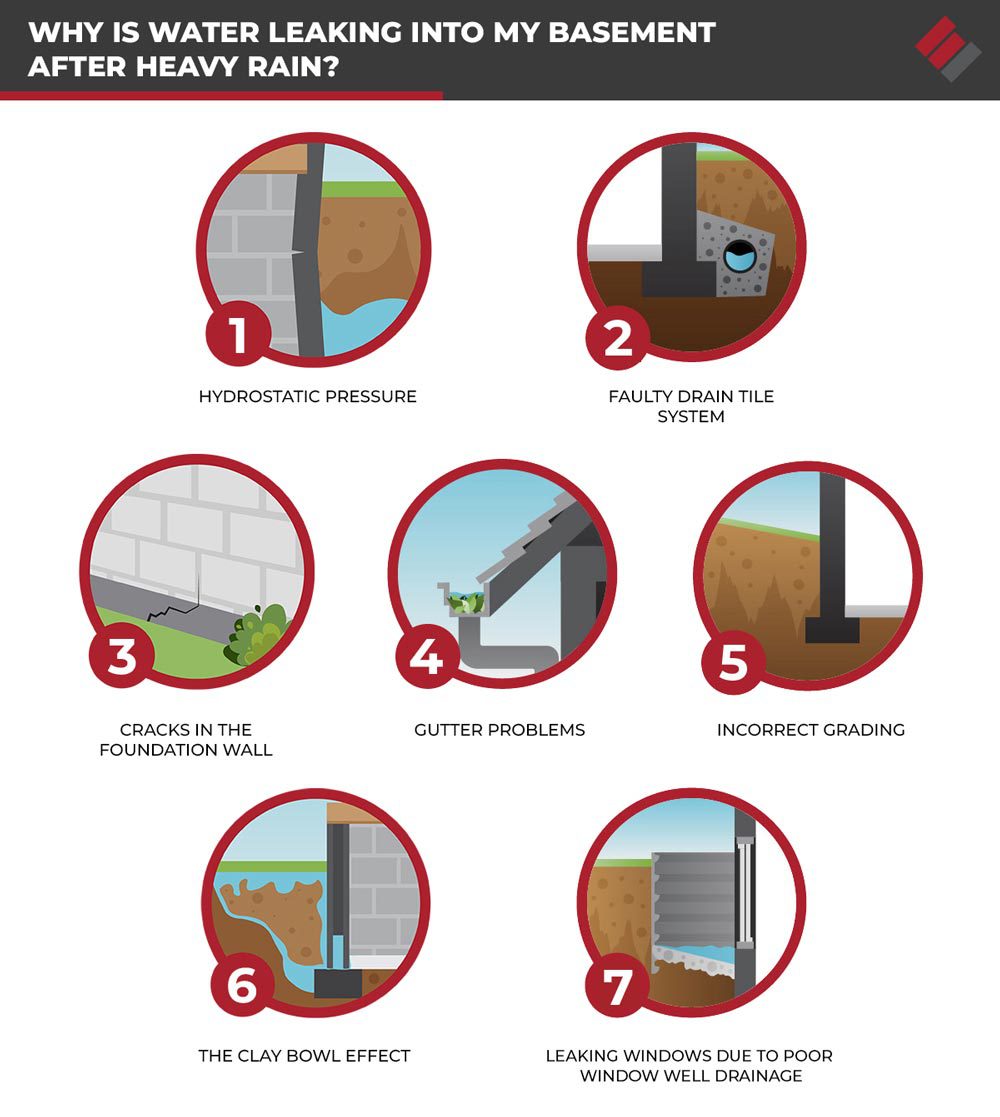
Why Should I Care about My Basement Flooding?
Just because basements are prone to flooding does not mean you should accept it as normal. Having a dry basement offers economic and health benefits and peace of mind.
Economic Benefits
Flooding can cause extensive damage to your home, especially if it happens repeatedly. There could be damage to electrical equipment, appliances, furniture, heirlooms, the floor, the walls, and the foundation. Such damage could mean tens of thousands of dollars in repairs.
On the other hand, a dry basement can help save you money. For one, it can lower your energy bill because a dry basement means less humidity in your home, and your HVAC system will become more efficient. And if you plan to sell your home, a waterproof basement will improve its value.
Health Benefits
A wet basement increases the humidity in your home and creates a haven for mold growth and allergens. By waterproofing your basement, you can protect your home and family.
Peace of Mind
When you waterproof your basement, you will not have to worry about an upcoming storm flooding it while you are out of town or reminding your children not to touch the water because they can be electrocuted. Instead of managing a hazard zone, you can safely claim your basement as added living space, turning it into a game room, a dream office, or an extra guest room.
How Can I Prevent Flooding in My Basement?
Let us reassure you that you can win the fight against flooding in your basement, even during heavy rainfall or in an area with a high water table. To prevent basement flooding, consider these four steps:
1. Minimize water in the soil around your foundation.
This is amongst the easiest ways to prevent basement flooding. Set up proper landscaping and an efficient gutter system to prevent soil from becoming waterlogged. Proper landscaping involves grading your yard so that water drains away from your home when it rains, avoiding planting water-hungry plants near your home, and creating grass barriers. Efficient gutter systems will also prevent rainwater and snowmelt from being deposited close to your foundation. They include gutters free of debris, sufficient downspouts, and downspout extensions that carry water at least ten feet away from your foundation.
2. Divert water away from your foundation.
Diverting excess groundwater in the soil away from your foundation will help prevent it from entering your basement. Solutions may include a French drain, an internal or external drain tile system, and a sump pump. These systems are designed to collect and carry water away from your foundation. They are instrumental in zones with high water tables. A professional will be able to determine the best solution for your home.
3. Waterproof your basement.
The final step to achieving a water-free basement is to waterproof it. Waterproofing involves sealing cracks with an epoxy or polyurethane injection and adding a vapor barrier or exterior waterproofing membrane. Sealing doors and windows is also important, as is ensuring a window well drainage system.
4. Maintain your plumbing, appliances, and drainage systems.
As you learned, flooding can be caused by plumbing issues like a broken pipe or a leaky water tank. A clogged drain, septic tank, or sump pump can cause flooding too. Maintenance may include installing sensors to detect leaky plumbing, regularly servicing your appliances, unclogging your drains, cleaning out your sump pump, and installing a battery backup for your sump pump in case of power outages. Maintaining your plumbing, appliances, and drainage systems is imperative to ensure your basement stays dry and your investments are not in vain.
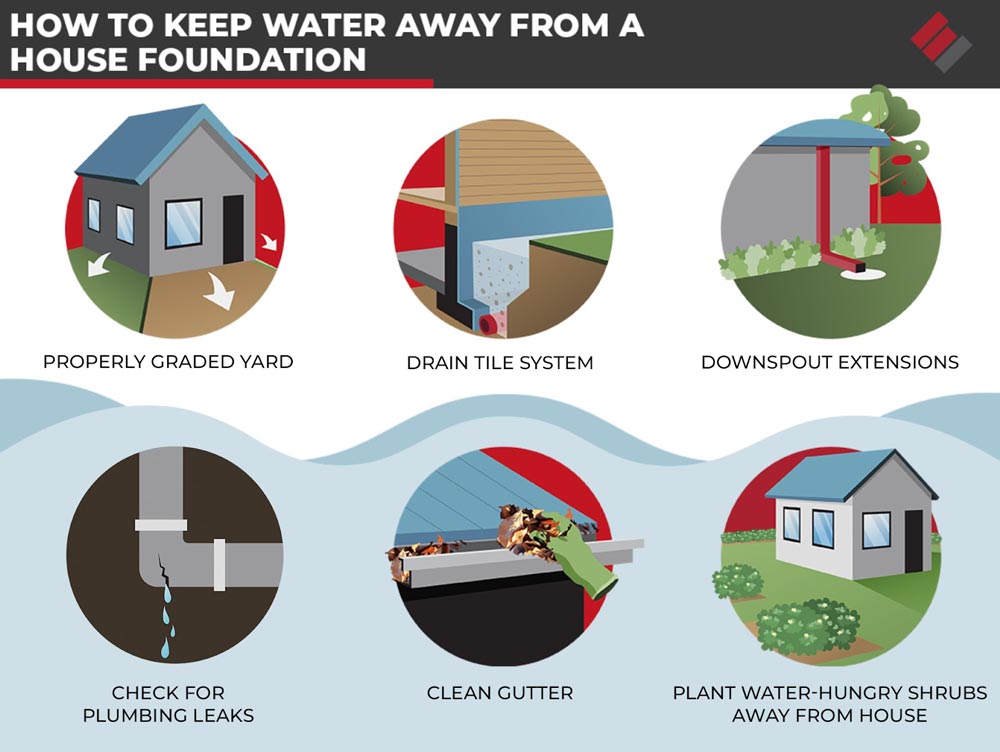
Want to learn more about keeping your basement dry and get some pro tips for preventing flooding this spring? Check out our YouTube channel.
What Do I Do If My Basement Is Flooded?
If your basement is flooded, follow these steps to ensure your safety:
1. Safety first.
If your basement has over one inch of standing water, it can pose a health and safety threat. It can contain harmful bacteria and, if it has come in contact with any electrical equipment, an electrical current that can kill you. So, turn off the electricity at the main breaker, and do not enter the water without protective equipment such as rubber boots and gloves. It is best to wait until the water has been fully pumped out before entering the basement.
2. Call a professional.
If you have any doubt that you can safely access your basement, call a professional. They will pump out the water, assess the cause of the flooding, and determine the extent of the damage.
3. Determine the source of the flooding.
Once you do this, you can determine how to prevent future flooding and make plans for necessary repairs.
4. Clean up and repair the damage.
Remove any damaged items and contact the correct repair professional. We also advise contacting your home insurance company to review your flooding coverage.
5. Waterproof your basement.
Once your basement is cleaned up, get a waterproofing and foundation repair expert to help you prevent future flooding.
Stop worrying about basement flooding and schedule a free home consultation for basement waterproofing and foundation repair. We have served areas throughout Nebraska, Iowa, Kansas, and Missouri since 1993.

